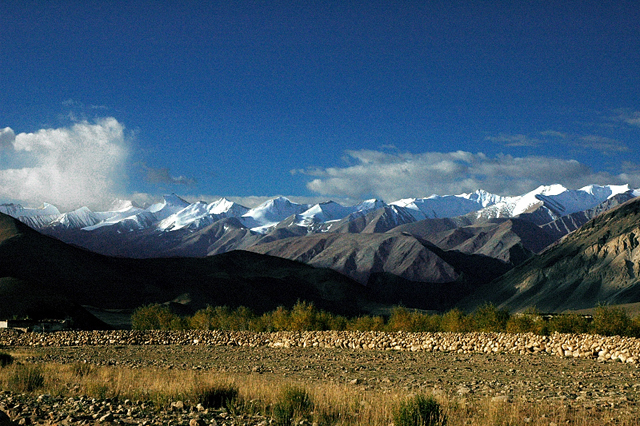It took a little over a week for the Ladakhis to spring into action. After the UN’s Intergovernmental Panel on Climate Change [IPCC] issued a report on the perils that changing climate conditions pose to the Hindu Kush/Himalayan region of Asia, several groups in Ladakh announced an action plan to deal with the crisis. Ladakhis are quite aware of how vulnerable they are to the expected disruptions of their water supplies, according to a news report from the Times of India last week.

Chetsang Rinpoche, the head of the Drikung Kagyu order of Tibetan Buddhism, took the lead in launching a project that will seek to make sure Ladakh is prepared to face the severe consequences of climate change in their region. The project focuses on rejuvenating a green cover over the Ladakhi foothills of the Himalayas.
The founders of the initiative titled their project Green Himalayas. They intend to develop a model site on 250 acres at Phobrang, in eastern Ladakh. They hope their model community will become a self-sustaining ecosystem in which the demand for energy is entirely met by renewable sources.

Speaking at the formal launch of the project on October 6, the Ladakhi Member of Parliament, Jamyang Tsering Namgyal, said that all 257 villages in the district are highly dependent for their water supplies on glacial melting. But the high mountain glaciers are rapidly melting away due to climate change. Can Ladakh even survive in another 25 or 30 years once they are gone?
Initiatives such as the Green Himalayas “will provide a solution to preserve the fragile ecosystem of the region and increase means of sustainable livelihood for the people,” the MP said. He appealed to experts in sustainable development as well as economists and agriculturalists to support the initiative in Ladakh as a model for the rest of the world.
A key initiative of the project, inspired by the IPCC report, will be to encourage groups in other areas of the Himalayan foothills to plant trees. Members of the two founding NGOs, Go Green Go Organic and Goldenmile Learning, along with residents of the local communities, have planted 25,000 trees.
Srini Srinivaisan, a business executive and the co-founder of Goldenmile Learning, sought to justify the efforts in Ladakh. “Climate crisis is everywhere. The Himalayas — our largest water lifeline — are melting. Can we remain silent?” he asked rhetorically.

Another business executive who is the other co-founder of Goldenmile Learning, Rajesh Patel, said roughly the same thing: “The Green Himalayas project aims to create an antidote to global catastrophe with local action and [to] help build strong and confident local communities.” He explained how the project at Phobrang will create bodies of water, build cooperatives, and work out partnerships with the local villagers. Sustainable development for the entire region should replace the dire consequences of global climate change in Ladakh, the founders hope.